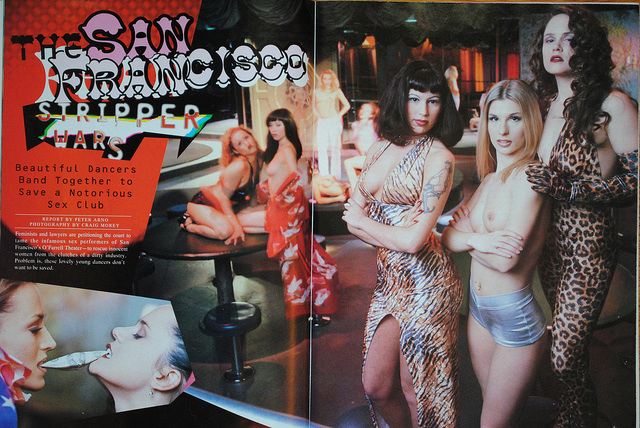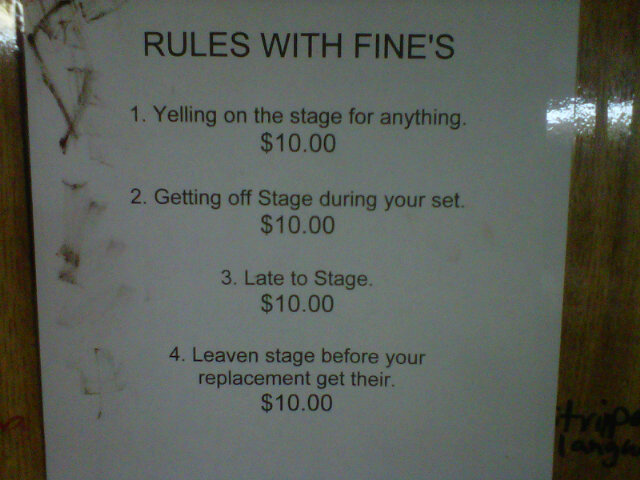
This isn’t so much a blast from the past (although, I was shocked to learn that 1997 was fourteen years ago) as it is déjà vu (no, not the place with the three ugly girls). I randomly came across an old issue of Hustler last week because I had a part in an indie movie that takes place in the nineties and it was a prop. It contains an article written during the first round of stripper employee-status and back wages lawsuits that started in San Francisco, focusing on the legendary Mitchell Brothers O’Farrell Theater.
It was an interesting read despite the opening sentences: “Six nude nymphs rise into the air. Writhing together, they kiss and giggle, licking one anothers’ perfect pussies, nibbling nipples, tickling and fondling pert breasts.” What else do you expect when you have to sandwich something substantial in between a photo editorial of a woman whose “favorite pastimes” are “tanning, exhibitionism, and masturbating” (not that there’s anything wrong with that) and an illustration of Abe Lincoln with a raging boner? I learned a few things, most notably that very little has changed. The independent contractor vs. employee debate is just as relevant as ever.
I’ve worked at clubs where I’ve been heavily fined for getting the flu, not allowed to dance to anything vaguely rap-sounding (read: black), told I can’t wear my hair up (too unfeminine), can’t wear my hair down (you can use your hair like a curtain, from behind which you French customers), can’t look at my cell phone, can’t read books and/or newspapers, can’t turn away alcoholic drinks, can’t bring my own food, can’t have free water, better sell one ugly club t-shirt per shift or buy it myself, etc. The list of ways in which I have not been treated like an independent contractor is endless and infuriating. The ways in which certain club owners and staff have treated me during my time in the industry have been far worse than anything any strip club patron has ever said or done to me. I’ve learned what it feels like to be truly expendable despite years of loyalty to a club and its bullshit rules, years of handing over a steady percentage of my income.
 I used to think that women who were opposed to suing for employee status and back wages were selfish and didn’t care about solidarity. I felt that we were unpaid employees and appreciated the idea of getting a wage if we were going to be micromanaged down to our hair. I thought that naysayers were just conformist company women who probably also think that all labor unions are scary. I actually believed that if we banded together and sued clubs for employee status, then they would be held accountable. They would either shape up and give us wages or get rid of their rules and leave us be to act as true independent contractors.
I used to think that women who were opposed to suing for employee status and back wages were selfish and didn’t care about solidarity. I felt that we were unpaid employees and appreciated the idea of getting a wage if we were going to be micromanaged down to our hair. I thought that naysayers were just conformist company women who probably also think that all labor unions are scary. I actually believed that if we banded together and sued clubs for employee status, then they would be held accountable. They would either shape up and give us wages or get rid of their rules and leave us be to act as true independent contractors.
A few things happened to change my mind. One of them was reading a very thoughtful two-part piece called “Stripped by Massachusetts,” written by a veteran east coast dancer, Pussy Per Se (best nom de plume ever, right?). I knew that strippers in Massachusetts had won class-action lawsuits against multiple clubs in 2009 and considered it a major coup. What I learned about the realities of those left working post employee-status victories was pretty bleak. You should really read the entire article, but in short, Mass. dancers now have the choice of working for $2.63 per hour and not keeping all of their private dance money or being able to deduct anything on their taxes, commuting out of state, or finding a different job.
The other thing that caused me to reconsider my position was meeting the woman who took several Portland clubs to court for unpaid wages. I tracked her down at her club and she was kind enough to welcome me into her home and answer all of my questions. What I discovered was that she had successfully sued and settled (with nondisclosure-agreements) all of her former clubs when she was living and working in Sacramento, CA. The money was gone, but she was still armed with a tried and tested technique for getting a strip club to pay up. While she was earnest and passionate, it was obvious that she had tricked herself into thinking that her personal exit strategy was something that she was doing for the greater good. She was hardly the “Cesar Chavez of stripping,” as Gawker put it.
This (and basic research) is how I’ve come to be skeptical and disproving of anyone initiating or participating in class-action settlements against strip clubs. I consider these types to be shortsighted and misguided at best. I think any strippers who would make more money earning an hourly wage should pursue a different vocation and not ruin it for the rest of us. As much as I think that being an unpaid employee under the guise of “independent contractor” sucks, I shudder at the thought of sacrificing my dance money. Without wages and with paying stage fees, I still make much more than any realistic hourly wage.
 It was bizarre reading this article, because I felt like I had read the ending first. The case was settled in 1998. Within a year, the stage fees at the Mitchelle Brothers O’Farrell theater were higher than before. I can’t say that I wouldn’t have sided with those suing the club (had I been around at the time), nor do I have all the answers now. I guess I’ll just say that if you don’t care about stage fees going up and or mind giving a lot of your settlement money to a lawyer, then go for it.
It was bizarre reading this article, because I felt like I had read the ending first. The case was settled in 1998. Within a year, the stage fees at the Mitchelle Brothers O’Farrell theater were higher than before. I can’t say that I wouldn’t have sided with those suing the club (had I been around at the time), nor do I have all the answers now. I guess I’ll just say that if you don’t care about stage fees going up and or mind giving a lot of your settlement money to a lawyer, then go for it.
I’m pro-union in general but I know I’m a dying breed (thanks, 40 years of movement conservatives). In my spare moments, I wonder about operating a strip club along the model of a car dealership: base pay + commissions. You’re right, an hourly wage wouldn’t work for the dancers, which means a club paying that hourly wage couldn’t attract higher-quality (and higher-hustle) dancers, at least in my estimation.
But if the club owner could guarantee a decent base minimum pay and add incentives for more sales of private dances or drink sales or whatever else, and offered things like 401k and medical benefits, would that be a better work environment? I’d want it to be a fun club for customers and dancers, as well as a profitable business, and the answer I get when I ask strippers what they look for in a club is “lots and lots of money and as little harassment as possible”. I’d think that would be possible.
Sadly, I’ll likely never have the opportunity to try out my business ideas. But it’s fun to think about.
Biting my tongue, mostly, and not in a sexy way. But. I danced in San Francisco for three years, in that club — that union one — yeah. It’s next door is the Hustler Club. Which is a Deja Vu owned club. Actually, aside from the union club, the Mitchell Brothers, and maybe Market Street Cinema, Deja Vu owned the whole town. Their monopoly — complete with contracts that specified how long you could touch your thighs vs. your between-boob-area or whatever, and how many BPM’s your music could be (and the race of the person performing it) — it definitely made the union club seem like a leftover slice of paradise, some relic of 90’s do-me activism. Not that solidarity was to be had in A Real Union Club, either. But the thing that felt like the biggest obstacle to dancers having control over their workplaces in any legit way was the the corporate monopoly, not the contractor-vs.employee status issue. If Deja Vu owns the town, you can’t just head down the turnpike to another place when you get fined $100 or locked out for calling in sick. It’s worse than Walmart.
If Denver’s own VCG Holdings aren’t as big as Deja Vu, it isn’t for lack of trying. Corporatism is ruining the strip club industry just like it did rock & roll. Very hard to find a free house for drinking and watching.
i worked in both the union club in SF and also a couple deja vu clubs. i hate deja vu, but i will say that maybe there are contracts about touching your thighs for a certain amount of time or whatever, but it’s not anything that anyone is held to. i don’t know why i wanted to point that out.
While it may not have been good for strippers working clubs in SF, some Southbay clubs proactively changed their fee structure in an interesting way that may actually have benefited strippers. Like, since we were not employees we could leave the club between our stage sets (since that’s what our stage fee is actually a stage lease and thus we can’t legally be required to stay in the club between sets. Unfortunately, this may have resulted in a few dancers getting DUI’s on the job, but I digress). We also could charge whatever we wanted for dances and customers pay a dance fee into a lil vending machine that timed us, and then payed us separate. So, we never payed the club a cut of our dances, the customer did. That way the club had no responsibility in keeping track of our earnings or 1099’ing us.
That typed sign of “Rules with Fine’s” is just atrocious. And people think that strippers are stupid? Look at some of the owners….Anyway, that’s not the point.
Personally…. my own personal politics lead me to feel that I wouldn’t want to be part of a union, however I can definitely agree that in many capacities we are still not treated as independent contractors.
I think it comes down to us trying to select where we work, and taking the management into account as part of the bigger picture which will become our environment. Ugh.
Oh no, I just read this.
I agree with the negative outcomes of many – okay, like almost all – cases. But I just can’t differ enough with the notion that it is “short sighted” to use the tools at your disposal to seek out better working conditions; if the tools aren’t getting the result you want, you need new tools, not just to suck it up. (Where would we be, I ask you, if steelworkers had just sucked it up in 1938? No very nice place, I suspect).
A factory union model is not likely to work for a strippers or prostitutes; we’re too transient and, frankly, unpredictable. But that model doesn’t work for actors, writers, musicians, or construction workers either. That is not the only model out there.
I tend to think the most obvious use of these kinds of lawsuits is as leverage to force a settlement for IC status on reasonable terms; settling for cash is the solution for women not going back to work. But without some kind of long stick you are, quite literally, at the mercy of club owners. I’m not quite ready to accept that is the best of the possible worlds.
I guess I should make the part where I say that I don’t have all the answers in bold. I definitely don’t think that this is the best of the possible worlds. I wasn’t trying to sound defeatist so much as I was trying to say that we need to anticipate how clubs will work around outcomes of class action lawsuits before we proceed.